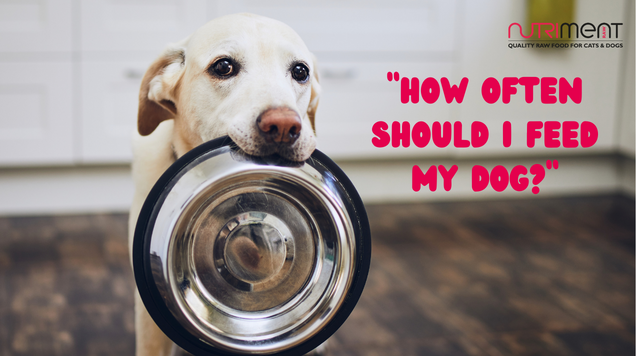How often should I feed my dog?

This is a common question for both new and seasoned pet owners alike. Whilst there are no strict rules – and it’s best to feed your dog in whatever way that’s right for them – the general recommendation for healthy, adult dogs is twice a day (morning and night). Of course, puppies, older dogs and dogs with certain health requirements need feeding outside of these guidelines.
How often should I feed my puppy?
Smaller stomachs need smaller but more frequent meals. Their rapid growth needs lots of nutritional support, so you’ll find they eat a lot in their first few months, and just like human babies, they can be fed on demand. Young puppies (under 6 months) should be fed at least 3-4 times a day, older puppies (6 months+) should be fed twice a day. Explore Nutriment’s puppy food, including weaning paste and specialist puppy formulas here for further information.
How often should I feed my adult dog?
As mentioned, healthy adult dogs generally need feeding twice a day, with small healthy snacks in between. If a dog is working or particularly heavily exercised, they may require a small additional meal in the middle of the day. It’s important to remember that dog’s thrive on habit and routine, so feeding at the same time and in the same place every day is a good idea. Use our raw dog food calculator here to ensure you’re feeding your dog the right amount.
How often should I feed my senior dog?
As dogs age, they slow down. This also applies to their digestion. An older dog generally uses less energy and digests their food slower, so it’s best to feed little and often. Twice a day may still work absolutely fine for your older dog, but if you notice that they aren’t finishing their meals, or show hunger queues outside of ‘breakfast’ and ‘dinner’, then giving smaller, more frequent meals may be a better idea. Explore Nutriment’s perfect formulas for older dogs here.
How often to feed a dog with pancreatitis?
Pancreatitis is an inflammatory reaction in the pancreas that can cause nasty symptoms such as stomach pain, vomiting and loss of appetite. It can be caused by high fat diets, obesity, trauma, toxin ingestion or medication. Should your dog be diagnosed with pancreatitis, then their diet needs to be reviewed. As well as being low fat (typically less than 10% fat), they should also be fed little and often, so as not to overload the digestive system and trigger further undesired side effects.
Common feeding concerns:
My dog ‘inhales’ his food
Some dogs just can’t help themselves but wolf down food. While most dogs do not show any adverse effects, some can experience as trapped wind or vomiting, which is not ideal for pet, nor owner. Slowing your dog down at mealtimes by using a Lick n Snack licking plate is a great way to prevent
My dog is sick after eating
As mentioned above, scoffing food down quickly can result in vomiting. However, there can be more serious causes of vomiting and you should consult a vet if your dog repeatedly vomits no matter what speed they eat, is losing weight or is losing interest in food.
My dog is refusing to eat
Dogs that suddenly start to refuse food are most likely unwell or in pain. If your usually food-mad dog is turning his nose up at dinner time, get him checked out by your vet to rule out anything serious. If the vet gives him the all clear, consider mixing up mealtimes and offering different raw foods, protein sources, treats and snacks.
My dog has started resource guarding
Resource guarding is when a dog becomes particularly ‘overprotective’ of his food or toys, resulting in growling, barking, or snapping if you get too close. This can occur from the puppy stage as a result of poor training or socialisation or can start after trauma or stress. It’s incredibly important to deal with resource guarding as soon as it arises. Consult a qualified and experienced canine behaviourist for help.
Still have questions about how much or how often your dog should be eating? Nutriment’s in-house canine nutritionists are available to discuss any questions, queries or concerns you may have about your pup’s diet. Get in touch with us here.




